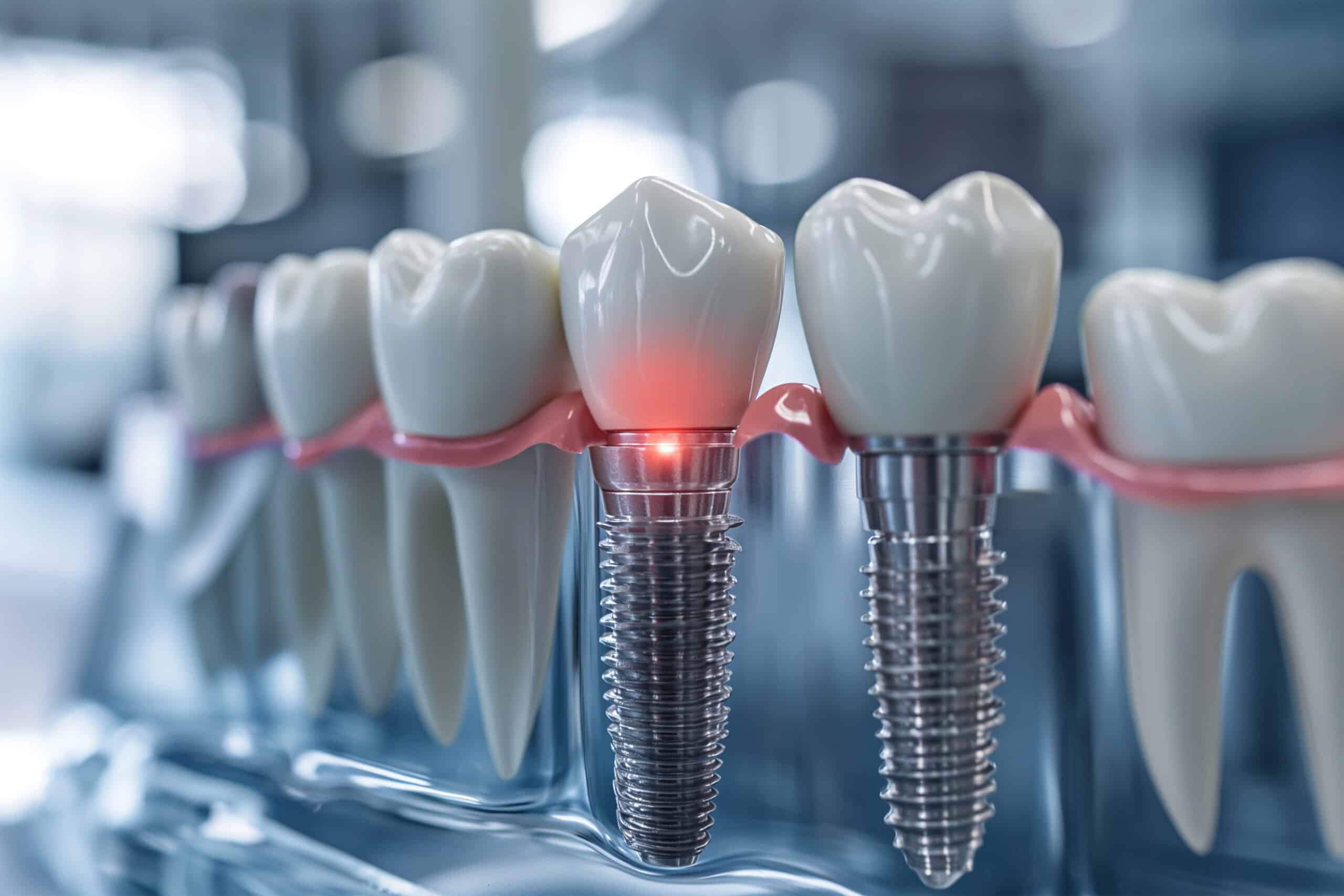What are the Benefits of Dental Implants
The Rising Demand for Permanent Dental Solutions
Tooth loss is common among adults worldwide. It affects not only oral health but also appearance, speech, and self-esteem. Traditional solutions like dentures and bridges offer temporary relief. However, dental implants provide a permanent and reliable solution. At Albanian Health Agency, we help patients find the best dental implant clinics in Albania. Our partner clinics use advanced technologies and internationally trained professionals. In this article, we explore the benefits of dental implants, supported by science and expert insight.
1. Long-Term Durability and Success Rates
Dental implants are renowned for their exceptional longevity, often surpassing traditional restorative options like dentures or bridges. Unlike removable prosthetics that may require frequent adjustments or replacements, dental implants are designed to be a permanent solution for tooth loss.
High Survival Rates Over Time
Extensive research underscores the durability of dental implants. A systematic review published in Clinical Implant Dentistry and Related Research reported a 10-year implant survival rate of approximately 96.4%, with a 95% confidence interval ranging from 95.2% to 97.5% . Another long-term study involving over 10,000 implants found cumulative survival rates of 97.4% at 3 years, 96.7% at 5 years, 92.5% at 10 years, and 86% at 15 years .
Factors Influencing Implant Success
While the overall success rates are high, certain factors can influence the longevity of dental implants:
-
Patient Health: Systemic conditions like diabetes or habits such as smoking can affect healing and osseointegration.
-
Bone Quality: Adequate bone density is crucial for implant stability.
-
Oral Hygiene: Poor oral hygiene can lead to peri-implant diseases, compromising implant success.
-
Surgical Technique: The expertise of the dental surgeon plays a significant role in implant placement and integration.
2. Natural Appearance and Function
Dental implants are renowned for their ability to closely mimic the look and feel of natural teeth. This is achieved through a combination of advanced materials, precise customization, and biological integration with the jawbone.
Aesthetic Integration
The visible part of a dental implant, typically a crown, is meticulously crafted to match the color, shape, and size of the patient’s natural teeth. This customization ensures that the implant blends seamlessly into the patient’s smile, enhancing overall facial aesthetics. A study published in the Journal of Prosthodontic Research highlighted that patients with dental implants reported high satisfaction rates due to the aesthetic benefits of implants compared to other options like dentures.
Functional Restoration
Beyond aesthetics, dental implants restore full chewing power, allowing patients to eat a wide variety of foods without discomfort or fear of prosthetic movement. Unlike dentures, which can slip or cause sore spots, implants are anchored securely in the jawbone, providing stability and comfort. This secure attachment also contributes to improved speech clarity, as there is no risk of the prosthetic shifting during conversation.
Patient Satisfaction
High levels of patient satisfaction have been reported among those who have received dental implants. According to a study by the American Academy of Implant Dentistry, 96% of patients who received dental implants were satisfied with their overall experience. This satisfaction stems from the implants’ natural appearance, comfort, and the confidence they instill in patients.
3. Bone Health Preservation
Tooth loss often leads to jawbone resorption, a process where the bone deteriorates due to lack of stimulation. This can result in facial collapse and affect the stability of remaining teeth.
Dental Implants Stimulate Bone Growth
Dental implants are unique in their ability to preserve jawbone health. They function like natural tooth roots, providing the necessary stimulation to maintain bone density. According to the American Dental Association, this stimulation helps prevent bone loss and maintains facial structure.
Clinical Evidence Supporting Bone Preservation
Research published in the Journal of the American Dental Association confirms that properly placed dental implants can effectively preserve up to 75% more bone volume compared to areas where teeth were extracted and not replaced with implants.
4. Improved Speech and Confidence
Tooth loss and ill-fitting dentures can significantly impact speech clarity and self-esteem. Dental implants offer a stable and permanent solution, restoring both functionality and confidence.
Speech Enhancement
Missing teeth or unstable dentures often lead to speech difficulties, including slurred words and lisps. Dental implants, securely anchored into the jawbone, provide the necessary stability for clear articulation. This stability allows individuals to speak naturally without the fear of teeth slipping or causing embarrassment.
Boost in Self-Confidence
Beyond functional improvements, dental implants have a profound psychological impact. Restoring a complete and natural-looking smile can significantly enhance self-esteem and social interactions. Patients often report increased willingness to engage in conversations and public speaking, attributing this to the confidence gained from their dental implants.
Patient Satisfaction
Studies have shown high levels of satisfaction among dental implant recipients. A survey indicated that 88% of patients experienced improved confidence post-implantation. Additionally, a 10-year follow-up study reported that 100% of patients were strongly satisfied with their speech capabilities after receiving dental implants.
5. Easy to Maintain and Clean
Dental implants are designed to function like natural teeth, requiring straightforward daily care to ensure their longevity and health. Unlike dentures, which may necessitate adhesives or nightly removal, implants remain fixed and are maintained through regular oral hygiene practices.
Daily Oral Hygiene Routine
-
Brushing: Use a soft-bristled toothbrush to gently clean all surfaces of your teeth and implants at least twice a day. Electric toothbrushes can also be effective in removing plaque around implants.
-
Flossing: Floss daily to remove debris between teeth and around the implant abutments. Specialized floss or water flossers can be particularly beneficial for implant care.
- Mouth Rinse: Incorporate a non-alcoholic, antibacterial mouthwash into your routine to help reduce bacterial buildup and maintain gum health.
Professional Maintenance
Regular dental check-ups are crucial for monitoring the health of your implants. Dental professionals can perform thorough cleanings and assess for any potential issues, ensuring the longevity of the implants.
6. No Impact on Adjacent Teeth
Dental implants are designed to function independently, preserving the integrity of neighboring teeth. Unlike traditional dental bridges, which require the alteration of adjacent teeth, implants do not necessitate any modification to surrounding structures.
Preservation of Natural Tooth Structure
Traditional bridges often involve grinding down adjacent healthy teeth to serve as anchors for the prosthetic. This process can weaken these teeth and increase the risk of future dental issues. In contrast, dental implants are self-supporting and do not rely on neighboring teeth for stability. This approach maintains the natural tooth structure and reduces the likelihood of complications.
7. Cost-Effective Over Time
While dental implants may require a higher initial investment compared to alternatives like dentures or bridges, they offer significant long-term savings. This is due to their durability, reduced need for maintenance, and the prevention of additional dental issues.
Initial Cost vs. Long-Term Investment
In countries like the United States and the United Kingdom, the cost of a single dental implant—including the implant, abutment, and crown—can range from $2,000 to $4,500. In contrast, Albania offers these procedures at a fraction of the cost, with prices ranging from €400 to €900 per implant .
For full-mouth restorations, the cost in Albania ranges between €5,000 and €12,000, whereas in the U.S., similar procedures can exceed $20,000.
8. Minimally Invasive and Safe Procedure
Modern dental implant procedures have evolved significantly, embracing advanced technology to enhance precision, reduce discomfort, and expedite recovery. Utilizing 3D imaging and guided surgery techniques, these procedures are now more accessible and safer for a broader range of patients.
Advanced Technology for Precision
3D imaging technology allows dental professionals to create detailed models of a patient’s oral anatomy, facilitating meticulous planning of implant placement. This pre-surgical planning ensures optimal positioning of the implant, minimizing the risk of complications and enhancing the overall outcome.
Suitability for Patients with Medical Conditions
Contrary to previous concerns, individuals with certain medical conditions, such as diabetes or bone loss, can often be suitable candidates for dental implants. With proper management and advanced surgical techniques, including guided bone regeneration and bone grafting, these patients can achieve successful implant outcomes. It’s crucial for patients to maintain good glycemic control and overall oral health to minimize risks.
Rapid Recovery and Minimal Discomfort
Thanks to the minimally invasive nature of modern implant procedures, many patients experience less postoperative pain and swelling. Most individuals can resume their normal daily activities within 1–2 days following the procedure. This swift recovery is attributed to smaller incisions, reduced trauma to surrounding tissues, and the use of advanced surgical guides
9. Versatility for All Tooth Loss Cases
Implants can replace:
-
A single missing tooth
-
Multiple teeth with a bridge
-
Full arches using All-on-4 or All-on-6 techniques
This versatility makes them suitable for nearly all types of tooth loss, from accidental trauma to aging.
“Implant-supported prostheses restore oral function and improve psychological health,” says Dr. Niklaus Lang, Emeritus Professor at the University of Bern.
Why Choose Albania for Dental Implants?
Albania is becoming a top destination for dental tourism in Europe. It combines affordability with high standards of care. With internationally trained professionals and advanced clinics, the country offers premium services at a fraction of Western costs.
At Albanian Health Agency, we connect patients with:
-
Verified clinics using EU-standard sterilization and equipment
-
Specialists in implantology with international certifications
-
Multilingual staff to ensure seamless communication
-
All-inclusive packages with airport pick-up, accommodation, and coordination
-
Personalized care managers for each patient
Whether you’re from Italy, Germany, the UK, or the US, we help make implant treatment in Albania smooth, safe, and effective.
Conclusion: The Lasting Benefits of Dental Implants
Dental implants provide more than just a new smile. They restore function, comfort, confidence, and long-term health. Their high success rate, aesthetic appeal, and durability make them the preferred solution for tooth loss.
With Albanian Health Agency, accessing affordable, expert implant care has never been easier. We connect patients to the best clinics in Albania and support them throughout their medical journey.
Start your dental implant journey today—because a healthy smile is a powerful investment in yourself.


